Litha is the year’s big exhale. The sun is high and the earth is warm. It’s the time for late dinners, and the invitation to shine without apology. Folklore remembers bonfires on ridgelines, herb gathering at dawn, and even flaming wheels rolled down hills as a mirror of the sun’s arc. Just because the days are long, doesn’t mean we need to work longer, it also means confidence seasoned with generosity.
Historically, Midsummer blurred the line between practicality and celebration. Communities tended fires for protection and luck, households hung herb bundles to dry, people swam, sang, and made vows they hoped to keep. The lore is honest about limits too: after the crest, the light begins to bend toward harvest. And the rhythm of the cycle continues.
In modern druidry I treat Litha as a two-handed act: First, name how you’re already shining, and choose how to share that light without burning out. Express your gratitude, speak three thank-yous to the day as if they were offerings. Balance fire with water: drink more, rest in shade, remember that visibility is a practice, not a punishment.
Symbols here are bright and simple: sun wheels for cycles, ribbons for bravery, fresh water for cooling excess heat. In the southern hemisphere, bring this solar feast to December and let it teach your nervous system how to hold joy with steadiness.
